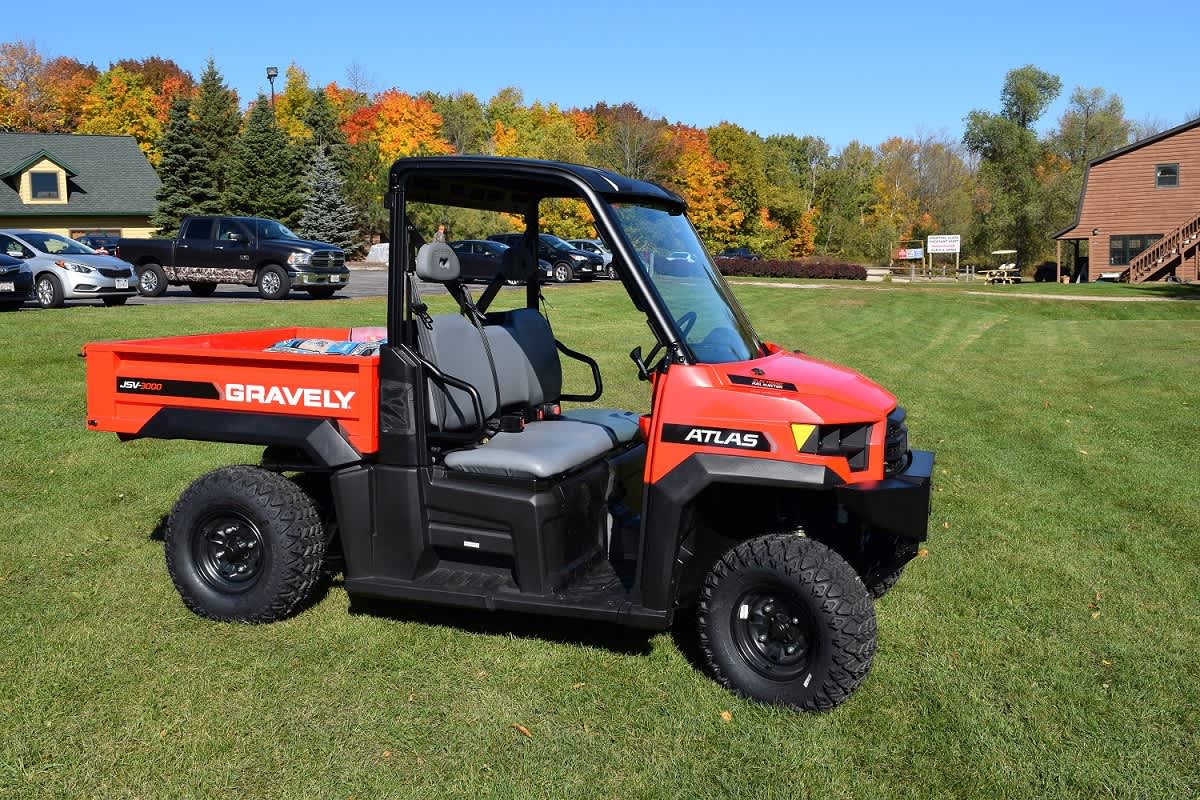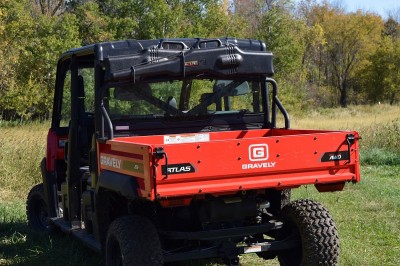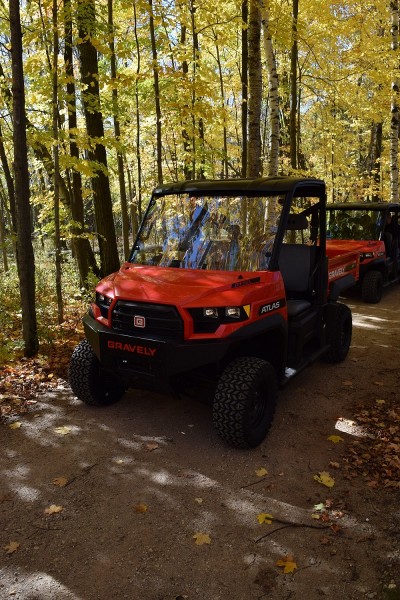First Ride: Gravely Atlas JSV
Derrek Sigler 12.07.14

There are a lot of UTVs available these days and more keep popping up all the time. As the overall number of vehicles on the market has increased, companies have begun to offer more specialized machines. Polaris has the lion’s share of the market with a lot of models, and their Ranger UTV is a dominant player in the utility/recreation arena. Polaris sought to bring their technology onto the worksite, while at the same time increasing their dealer network. Enter the Ariens Corporation.
Ariens has been a family-owned business based in Brillion, Wisconsin since 1933. They got their start manufacturing agricultural equipment, much like Polaris did. Today they are a leading manufacturer of power equipment, making snow blowers, lawn mowers, and more. In 1982, they acquired the Gravely Corporation, a major manufacturer of lawn care equipment. Polaris came to Ariens with the idea to partner on a worksite-specific UTV. The end result is the Atlas JSV (Job Site Vehicle).
Mixed genetics
I’ll be the first to admit that I went into my introduction to the Atlas JSV with the mindset that it was a rebranded Ranger. Let me clear up right now that I was very wrong. The driveline and frame are from the Ranger UTV, with some very different features. The bodywork, controls, and function are distinctly Gravely. The end result is a machine that is purpose built and pretty interesting.

There are four basic variations of the Atlas JSV. The machine either features a Polaris 570 Prostar engine, or a Kohler 1028cc diesel engine. The 570 produces 40 horsepower from a single-cylinder engine that is common in Polaris machinery right now. The Kohler mill pumps out 24 horsepower. Both engines are available in a three-seat or a six-seat configuration. The three-seater 570 weighs 1,575 pounds version, and the Kohler 1,675 pounds. Adding the second row of seating takes the 570 to 1,800 and 1,900 for the diesel. Both machines have a 2,000-pound towing capacity rating.
Power steering is available as an optional accessory. After driving both variations and engines, I recommend spending the few extra bucks for power steering. The added weight of the diesel especially screams for power steering. Other options are available, too. Most of the Polaris Lock-and-Ride accessories will fit the JSV and Gravely is working on some new stuff of their own.
The styling is all Gravely. Two things that immediately draw your attention are the front bumper, which is about as beefy as you’ll find, and the dump box. Both are works of art. The front bumper and stylish grill make the front of the Atlas look mean. The dump box is awesome. Constructed out of steel, the MX-18 Jobbox bed has an astounding 1,250-pound capacity and 1,900-pound payload capability with 18 cubic feet of cargo space. It will hold a fully-loaded pallet. An electric deck lift comes standard, so you can dump cargo with the touch of a button.
Of course, all of that cargo capacity doesn’t mean anything unless the vehicle can haul it, right? Out front, the Atlas machines have Polaris Ranger suspensions with spring rates set for the job site. Out back, there is the de Dion suspension system developed for the Polaris Brutus commercial vehicle. This combination gives the Atlas a good ride quality with the cargo capacity needed to get the job done. The de Dion system lets you fill up the box or tow a hefty load without sacrificing ground clearance.

Markets, targets, and sales
So who is the target buyer for the Atlas JSV? The name “Job Site Vehicle” ought to tell you something. This machine is geared for hard work, be it with construction, agriculture, or lawn care. Wherever there is a job that needs a workhorse, you could see the Atlas there. Both machines are limited to 35 mph at top speed, which is plenty fast for the type of environment they’ll be used in.
The secondary market is what interested me the most—land managers. For some of us hunters, our ATVs and UTVs are used primarily for managing our lands for hunting. We’re using them to haul supplies, put in food plots, and going on the hunt. For these tasks, the Atlas JSV would really shine. I wouldn’t mind getting my hands on one for use around my farm.
Overall impressions
I liked the Atlas JSV, especially the six-person, 570 setup. The styling is very good and the features are good, too. If it were mine, I’d swap out the Carlisle All-Trail tires for some proper knobbies, but for the wide reach of the Atlas, those are decent tires for sure.
Polaris was smart to seek out Ariens. Ariens is an outstanding company with a great dealer network and a solid reputation for building some of the best power equipment you can find. Adding the Atlas to that network opens new doors for both companies. According to Ariens, reaction from the dealers has been overwhelming. In fact, all of our test units that we rode on were already spoken for by the dealers.
The partnership opens up a lot of possibilities for future new machines and products for Ariens. A look at what Polaris has offered in the Ranger line can let you see that there is a lot of potential there. Combine that with what Ariens does best and the future looks pretty good for the Wisconsin company.
If you’ve looked at the Polaris Ranger and thought that it was close to what you needed for your tasks, but want a heavier-duty version, you need to take a look at the Gravely Atlas JSV. It is a tough, purpose-built machine, backed by a one-year warranty and two long-lived and well respected brands. Just make sure you get the power steering!

